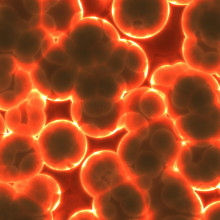How does the microbiome work? We need all those little good bugs in our gut but what are they doing? Ruairí Robertson wrote us this answer...
In this episode

- Naked Body: The microbiome's meaning
Naked Body: The microbiome's meaning
Ruairí Robertson, Queen Mary University of London
How does the microbiome work? We need all those little good bugs in our gut but what are they doing? Ruairí Robertson wrote us this answer...
If you counted all of the human cells in your bones, blood, skin, hair, brain and every other organ, there would be roughly 30 trillion of them. However, these make up only about half of the cells in your body. Confused? Your body is also home to 40 trillion bacterial cells. Therefore you are more bacterial than you are human, by cell number.
All of these bacteria and other types of microbes are collectively known as the microbiota or microbiome. These microbes are everywhere on and in your body: all over your skin, in your lungs, your mouth and every other nook and cranny. However, a majority of them live in your intestines. This is because your gut provides a dark, moist environment with little oxygen and lots of nutrients, the perfect home for microbes.
So how do you first become colonised with this microbial organ? Inside the womb, babies live in a relatively sterile environment, protected from the outside world of microbes. However, at birth, a baby is suddenly coated with microbes that live in the mother’s birth canal. These microbes have evolved to be the first to come in contact with the baby. Babies also pick up microbes when breast-feeding from the mother, and throughout everyday life.
So what is the point of this microbial organ? Firstly, your gut microbiota help you to digest food. We don’t have the enzymes to digest fiber that you find in fruits, vegetables, whole grains and many other foods. This fiber is instead the perfect food for your gut microbes, although even they cannot digest all of it. Your gut bacteria are also very important in making essential vitamins.
Your gut microbiota is also extremely important for developing and training your immune system. Your immune system helps you to fight off infections, but it first has to be trained how to do this. The many thousands of different species of microbes in the gut communicate with your immune cells to tell them which bacteria are friendly and which are invaders which should be attacked.
Finally, your gut microbes may even influence your brain health and how you think and behave. This happens in a number of ways. Your gut and brain are connected physically through millions of nerve fibres which send messages to and from the central nervous system. The digestive tract can tell the brain that it is full, if its walls are stretched, and it can also signal to the brain about the types of food that are being digested.
So take care of your gut, feed your trillions of microbial friends with lots of fruit, vegetables, whole grains, plain yoghurt and healthy food. They influence your health in more ways than you might think.
Related Content
- Previous Group Think
- Next Oxygen Shortages, UFOs & Nuclear Waste










Comments
Add a comment